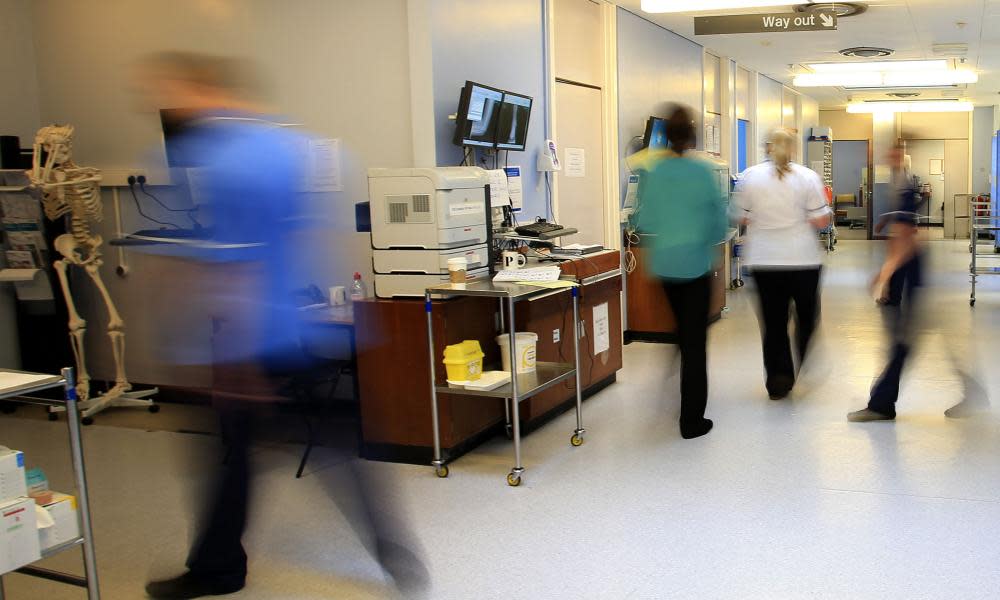Rules allowing upfront charges for foreign users of NHS come into force

Migrants and visitors to the UK not eligible for free healthcare will from now on be charged upfront for the cost of their treatment, as rules come into force that also extend charging to community health services and charities that receive NHS funding.
The system, designed to counter “health tourism”, requires medical staff to establish whether patients are eligible for state-funded healthcare before providing treatment. If they are not, patients must pay an upfront charge that is currently set at 150% of the cost to providers.
But critics – including a former chief executive of the NHS, a range of civil society groups and hundreds of doctors who recently signed a letter to the health secretary – say the new rules, in force from Monday, will deter ill people from seeking life-saving treatment, and patients with infectious diseases could pass undetected.
There is also confusion over how the rules should be applied, with a survey of NHS professionals showing that eight in 10 were unable to make the crucial distinction between the eligibility of refugees, asylum seekers and those whose application for asylum had been rejected.
There are fears that an identification-checking scheme currently under pilot at 20 NHS trusts will be extended across the country, raising the prospect of a future where patients must attend hospital with their passports and driving licences to guarantee receiving treatment they are entitled to.
While hospitals have had a charging regime in place for some time, patients not covered by the NHS have, until now, been sent a bill for the cost of their care after treatment. The Department of Health says many such bills have gone unpaid after trusts lost touch with patients who had left the country or otherwise disappeared.
According to the rules laid out in the National Health Service (charges to overseas visitors) (amendment) regulations 2017, a piece of secondary legislation that passed parliament with no debate, all organisations receiving NHS funding must now charge ineligible patients before they are treated. The charging regime will also be extended to services such as health visiting, school nursing, community midwifery, community mental health services, termination of pregnancy services, district nursing, support groups, advocacy services, and specialist services for homeless people and asylum seekers, according to Doctors of the World.
The DoH stressed that upfront charges would only apply for planned, elective treatments, and that no one would be denied accident and emergency care or maternity services – although some of these can be charged for retrospectively.
However, campaigners against the change have collected many anecdotal accounts of patients being wrongly charged for care, in one case because a patient had a foreign-sounding name, or charged for treatments that are supposedly exempt from the regime.
A survey of NHS staff by Medact found almost two-thirds (62%) of respondents thought failed asylum seekers were ineligible for free primary care, with another third (30%) believing failed asylum seekers were not entitled to free emergency NHS care.
“It is clear that NHS staff do not have the training and support they need to correctly identify who is and isn’t entitled to healthcare,” Dr Ruth Wiggans, co-chair of Medact, said. “What we’ll see as a result is people who should be receiving NHS care being wrongly turned away or simply being too worried to seek help themselves.”
Health minister James O’Shaughnessy said: “The NHS is a cherished national institution that is paid for by British taxpayers.
“We have no problem with overseas visitors using our NHS as long as they make a fair financial contribution, just as the British taxpayer does. The new regulations simply require NHS bodies to make inquiries about, and then charge, those who aren’t entitled to free NHS care. All the money raised goes back into funding and improving care for NHS patients.”
Lord O’Shaughnessy added: “We are clear that some vulnerable groups are exempt from charging and the NHS will never withhold urgent and immediately necessary treatment.”

 Yahoo News
Yahoo News 
